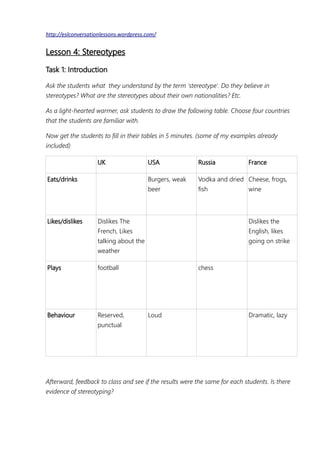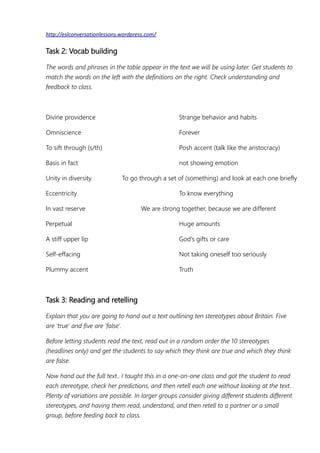Stereotype lesson2
- 1. http://eslconversationlessons.wordpress.com/ Lesson 4: Stereotypes Task 1: Introduction Ask the students what they understand by the term 'stereotype'. Do they believe in stereotypes? What are the stereotypes about their own nationalities? Etc. As a light-hearted warmer, ask students to draw the following table. Choose four countries that the students are familiar with. Now get the students to fill in their tables in 5 minutes. (some of my examples already included) UK USA Russia France Eats/drinks Burgers, weak beer Vodka and dried fish Cheese, frogs, wine Likes/dislikes Dislikes The French, Likes talking about the weather Dislikes the English, likes going on strike Plays football chess Behaviour Reserved, punctual Loud Dramatic, lazy Afterward, feedback to class and see if the results were the same for each students. Is there evidence of stereotyping?
- 2. http://eslconversationlessons.wordpress.com/ Task 2: Vocab building The words and phrases in the table appear in the text we will be using later. Get students to match the words on the left with the definitions on the right. Check understanding and feedback to class. Divine providence Strange behavior and habits Omniscience Forever To sift through (s/th) Posh accent (talk like the aristocracy) Basis in fact not showing emotion Unity in diversity To go through a set of (something) and look at each one briefly Eccentricity To know everything In vast reserve We are strong together, because we are different Perpetual Huge amounts A stiff upper lip Godâs gifts or care Self-effacing Not taking oneself too seriously Plummy accent Truth Task 3: Reading and retelling Explain that you are going to hand out a text outlining ten stereotypes about Britain. Five are 'true' and five are 'false'. Before letting students read the text, read out in a random order the 10 stereotypes (headlines only) and get the students to say which they think are true and which they think are false. Now hand out the full text.. I taught this in a one-on-one class and got the student to read each stereotype, check her predictions, and then retell each one without looking at the text. Plenty of variations are possible. In larger groups consider giving different students different stereotypes, and having them read, understand, and then retell to a partner or a small group, before feeding back to class.
- 3. http://eslconversationlessons.wordpress.com/ TEXT: Five stereotypes about Britain that are simply not true, and 5 that really are. It would be valuable indeed if divine providence blessed us with the gift to âsee ourselves as others see usâ as Robert Burns mused in his famous poem âTo A Louseâ, but although weâll never achieve this sort of omniscience, itâs still fun to sift through some of the most common stereotypes about Britain and the British and consider which have any basis in fact. Naturally, itâs impossible to generalise over the beliefs, habits and attitudes of each and every Briton, and as a modern multicultural nation we also celebrate unity in diversity. However, one thing Britons have in vast reserve is eccentricity, as evidenced by their love of British themed fancy dress and their perpetual ability to combine a stiff upper lip with surreal and self-effacing humour. So here follow five stereotypes about Britain which are false and five which have some basis of truth. FALSE: Everyone in Britain is closely related to the Royal Family Since Britain has a population of over 63 million this is not the case, but some unlikely Britons in line for the throne include Catherine Laing; a West Country travel agentâs wife and Chloe Felton, a farmerâs daughter from Devon. In fact, there are only around 20 people in the UK who bear the title âYour Highnessâ or âYour Majestyâ and around a further 70 who can claim to be members of the extended Royal Family or Royal Household; so itâs a reasonably exclusive club! FALSE: It rains every day in Britain Although Britain receives its fair share of rain, in 2009 the UK received less annual rainfall than Norway, Switzerland, Japan or New Zealand. Itâs true that sodden citizens of Glasgow can expect around 48 inches of rain a year but this is only half the amount that the good people of Bergen, Norway can look forward to! FALSE: Pubs in Britain only serve warm beer Whilst some ales are still served warm, the popularity of continental lagers means that most beers served in the UK are now served cold. In fact, British lagers such as Carling and Tennents are marketed as best served cold and even Guinness stout has an âextra coldâ version due to popular demand!
- 4. http://eslconversationlessons.wordpress.com/ FALSE: Everyone in Britain has a plummy accent and talks like the Queen This is untrue as there are hundreds of distinctive regional accents across the UK and Standard English is itself a synthetic language amalgamated from elements of regional languages. For some interesting explorations of languages and dialects, check out the poem âThe 6 OâClock Newsâ by Tom Leonard and the song âCockney Translationâ by Smiley Culture. FALSE: All Britons have bad teeth There seems to be no factual basis for this stereotype, dental hygiene in the UK compares well to that of any other developed nation. However, some British cultural icons do have very âunusualâ teeth; such as Rab C Nesbitt and Ken Dodd. TRUE: Britons drink tea all day Each Brit consumes 1.89 KG of tea per year according to 2009 figures and are ranked 6th in a list which is topped by the United Arab Emirates, followed by Ireland and Mauritania. Of course, tea is the 2nd most popular drink in the world next to water, so Britons are not alone in their collective love for a cuppa! TRUE: Britons love to queue Although no-one in their right mind loves to queue anywhere, many British people will state that they would prefer forming an orderly queue than the type of âfree for allâ policy they may have seen adopted in other countries (although this in itself might be yet another stereotype!) However, the record for longest toilet queue is actually held by the Belgians and occurred when 756 people waited in line to use a latrine as part of UNICEF World Water Day activities! TRUE: Britons do everything by the book Business groups are constantly complaining about the reams of Governmental red tape, rules and regulations and (in their view) the effect it has on jobs being lost as businesses move abroad to avoid bureaucracy. Britain is unarguably one of the most rule-bound nations on Earth but it is debatable whether these regulations protect our freedoms or infringe them.
- 5. http://eslconversationlessons.wordpress.com/ TRUE: Britons are obsessed with the class system Although traditional class boundaries have become more blurred over the years, most Britons do tend to identify with one of the 3 main classes for better or for worse and although some claim that social mobility is greater now than it was for previous generations, evidence suggests that Britain unfortunately remains divided along class lines. TRUE: Britons love to celebrate Royal occasions This is definitely true as Royal Weddings and Jubilees are lavish occasions which millions of Britons love to celebrate by waving Union Jacks, organising street parties and donning fantastic Great British fancy dress costumes! Indeed, as 24.5 million viewers watched the Royal Wedding of Prince William and Princess Catherine on TV last year, if a Royal Wedding was held every week it would certainly eclipse viewing figures of âEastendersâ , âCoronation Streetâ and âThe X Factorâ!





